Honduras: Assisting reforms in the national police
DCAF supports the police reform process in Honduras at the national and institutional levels through its multi-year Police Advisory Programme, as part of the Citizen Security Programme of the Swiss Agency for Development and Cooperation (SDC).
The programme’s objective is to support the Honduran Ministry of Security and the National Police, in collaboration with the security and justice systems, to increase their institutional integrity and effectiveness within a framework of human rights and meritocracy. Through our project office in Tegucigalpa, DCAF strengthens the police reform process in the following areas:
- Strategic and operational management
- Community policing
- Police education
- Use of force
- Police accountability
- Human resources management
- Mentoring with a psychosocial approach
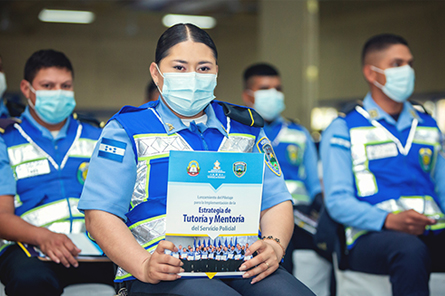
Workstreams/Projects
Addressing the diverse needs of women, men, girls and boys as victims of insecurity, agents of violence, and security sector personnel can improve both human and state security. The ability to integrate a gender perspective is a fundamental principle of security sector reform and a defining attribute of effective security institutions.
Honduras has historically suffered one of the worst femicide rates in the world, and DCAF, the Swiss Development Corporation (SDC) and the Honduran National Police (HNP) have been working together to strengthen police response to this fundamental issue.
Using our methodology of co-design, DCAF has supported the HNP in analysing its internal position regarding gender equity, constructing a strong evidence base to then deliver tangible improvements to safeguard and aid all police officers in Honduras.
Albeit all countries and all police forces have a long way to go to reach gender equity, the work in Honduras has demonstrated the will of the HNP leadership to continue this journey and solidify the results delivered.
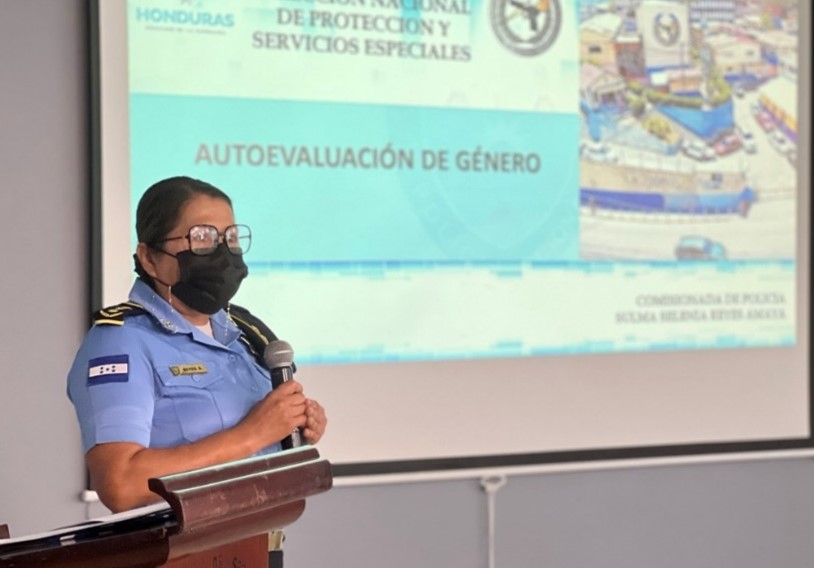 In DCAF’s first full year in Honduras, we aided the HNP Gender Unit in the delivery of their first ever commemoration of the 25th of November inside police compounds. Buoyed by further support to bespoke conferences focusing on the needs of female police officers and thanks to organisational champions in the police such as Comisionada Sulma Reyes, this work helped to open the door to further conversations regarding the need to better understand the status of the HNP on gender equity.
In DCAF’s first full year in Honduras, we aided the HNP Gender Unit in the delivery of their first ever commemoration of the 25th of November inside police compounds. Buoyed by further support to bespoke conferences focusing on the needs of female police officers and thanks to organisational champions in the police such as Comisionada Sulma Reyes, this work helped to open the door to further conversations regarding the need to better understand the status of the HNP on gender equity.
In 2020, at the height of the pandemic, the HNP implemented the DCAF Institutional Gender Self-Assessment (GSA), an internationally renowned methodology that offers security institutions an internal diagnostic, self-run, that analyses issues and offers recommendations for improvements. This tool was translated into Spanish thanks to funding from SDC, along with the translation of the DCAF Gender Toolkit into Spanish.
The assessment contributed to significant learning gender-responsive policing. A comparative analysis of gender self-assessments in Colombia, Honduras and Ukraine is available, intended for all security sector institutions, particularly police services, armed forces and justice sector institutions, and donor agencies which are interested in or are currently planning to undertake or support gender-sensitive reforms of their institutions.
The HNP ran the self-assessment, adjusting to the new reality of the pandemic, and delivered an extensive and robust internal diagnostic :
Towards the end of 2020, DCAF analysed the impact of the pandemic on gender and gender-based violence and delivered briefings, training and webinars on the issue.
As the world began to open up again, the HNP external control agency, DIDADPOL requested gender sensibilisation training for 100% of their staff. DCAF delivered on this in September of 2021, designing specific training packages based on the results of the Self-Assessment to ensure the information was context-specific.
DCAF also constructed our organisation’s first ever podcast, linked to 19th of November, International Men’s Day, where we interviewed two male police officers to ask them how they viewed their role in aiding gender equity.
This was aided by two further communication elements. The first was a blog from DCAF outlining the importance of gender equity in policing, and the second was a ‘Gender Diary’, a DCAF-designed journal that senior police leaders can use daily for their notes that includes weekly and monthly messages on gender equity, based on the Honduran Police context and needs.
DCAF then aided the conversion of the diagnostic evidence base into the first Gender Policy for the Honduran National Police. This landmark document was created by representatives from across the institution and formally approved by the Director General in July of 2022.
This Policy is a key document for the police and forms the bedrock of their gender training, and is currently under implementation by the HNP Gender Unit. The success of this Policy led to further requests for training, which DCAF delivered to over 150 representatives from different departments of both the police and the security ministry, providing the training to kickstart the HNP’s ‘regionalisation’ programme, a new initiative where a senior police officer from each of the 36 departments in Honduras receives training on a specific subject and is then charged with cascading this learning within their geographic area to other officers.
Further podcasts were delivered, this time recording the voices and lived experiences of senior female officers in the HNP leading the change in gender equity, and the challenges ahead. DCAF also supported the police on their first social media campaign to specifically show their role in the 16 days of activism following the 25 November.
For DCAF, and the HNP, institutionalisation is a broad process that requires more than solely one-off training and policy documents. It requires embedding knowledge into the organisation, and this has been the focus for 2023. This year, DCAF has designed a 120-hour diploma on gender equity, based on the HNP Policy and embedded within the Honduran Police University.
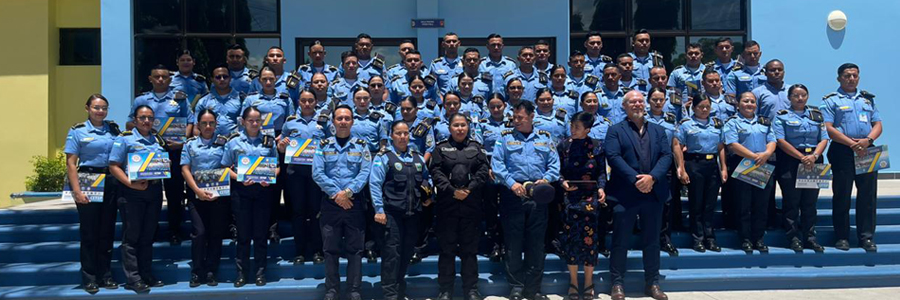
49 police officers were trained as trainers and will now cascade the knowledge to their peers via the diploma, which is also available as a 40-hour course and a 16-hour seminar supported by on-line modules to aid distance learning. As a result, DCAF was asked to present the success of this work in internationally in seminars such as the Latin America-wide training in Cartagena in July of 2023.
DCAF continues to support the HNP in this key issue and has recently published learning on how these successes were gained collaboratively. Gender equity is a priority for DCAF, and whilst being aware of the long path ahead, the joint work with the HNP goes from strength to strength due to how important this component is in security sector governance.
DCAF has been providing advisory support to the Honduran National Police, with the financial aid of the Swiss Agency for Development and Cooperation (SDC), in the modernisation of the police via its office in Tegucigalpa. Here we outline our work in strengthening the governance of use of force and institutionalising new approaches that fully align and comply with international standards.
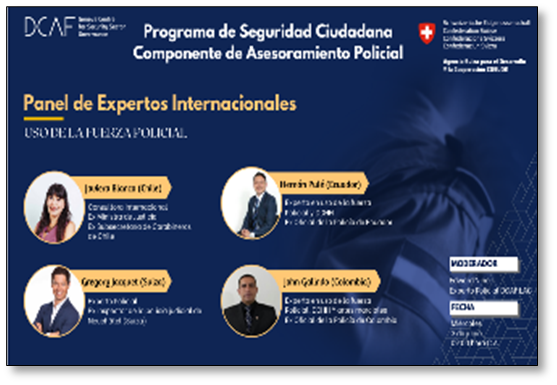
This work started with panel discussions and analysis from DCAF international experts that offered views and experiences from other countries and global learning.
Our work with the Honduran National Police has been based on a methodology designed by DCAF. This publication titled "Good Governance of Police Use of Force" outlines how local actors can design and produce context-specific models and manuals on the use of force, based on international norms and local knowledge, using a co-design methodology with local actors, as well as offering training and systemic advice on implementation.
DCAF began working with the Honduran National Police on the topic of Use of Force in 2020, analysing the national laws and operating procedures and producing a legal and normative framework based on international and national systems.
As a result, the Honduran National Police developed with DCAF a New Model of Use of Force and consolidated the results of this work in the Manual of Use of Force and Firearms, now an institutional guidance document via official decree within Honduran law. This is the first of its kind for Honduran policing for over 23 years.
This article, titled "Police modernisation: model of use of Police force, a symbol of an institutional transformation" explains the importance of this work, the technical and legal aspects involved, and the benefits for all actors of having clear and concise guidelines on the Use of Force.
To further mainstream these advances, DCAF worked with the Honduran National Police to develop an institutionalisation plan. This plan includes training at all levels of the police, from senior leaders in the Strategic Directorate to every officer in the National Police via diplomas, courses, and seminars jointly developed and delivered between DCAF and the National Police University.
The diploma has been integrated via a train-the-trainer programme, whereby DCAF trained 56 police officers who then went on to train 280 more trainers, who will cascade the information throughout the entire police force of over 20,000 officers.
For DCAF and the Honduras National Police, training is only a part of the process of institutionalisation. Other aspects of the plan include new inspection regimes created by the Inspectorate General, applied knowledge from external control agencies, construction of detailed operating procedures, innovative communication components, and integration of the manual throughout the institution.
DCAF is continuing to support the National Police in this important work, using other publications such as "Accountability in Police Use of Force guidance documents" and technical assistance to the lead departments within the police”
Organisational integrity exists when an organisation operates in line with a set of clearly defined ethical values that are integrated into internal processes. The organisation ensures respect and visibility of these values by appropriate communication, leadership, strategies, policies, rules and control, accountability, and transparency.
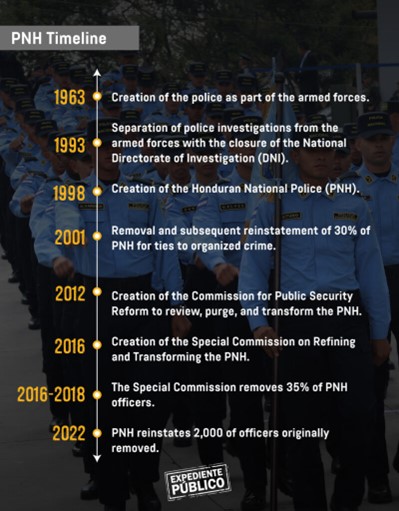 In Honduras, DCAF has been working with the Security Ministry police external control agency, the Directorate of Police Disciplinary Affairs (DIDADPOL), since 2019 to aid them in their role, created following the ‘purge’ of policing in 2016. DIDADPOL investigate police misconduct, offer recommendations on individual cases to the Security Minister and run police-wide prevention programmes to improve integrity.
In Honduras, DCAF has been working with the Security Ministry police external control agency, the Directorate of Police Disciplinary Affairs (DIDADPOL), since 2019 to aid them in their role, created following the ‘purge’ of policing in 2016. DIDADPOL investigate police misconduct, offer recommendations on individual cases to the Security Minister and run police-wide prevention programmes to improve integrity.
The initial set up and transition for DIDADPOL was very difficult, as they were low on resources and inherited 1,760 cases to investigate immediately, whilst simultaneously creating new processes, systems and recruitment of staff to implement their role.
In 2019, DCAF and SDC assessed the role of the agency as being integral to improving integrity in Honduras, reducing corruption and improving confidence in policing. DCAF and DIDADPOL agreed to run a full diagnostic focused on improving capacity and building a solid base for them as a platform for growth.
This diagnostic was run in collaboration with DIDADPOL’s full participation, focused on several areas of their work and included 23 recommendations that would serve to increase and build capacity of the agency to fulfil its role and better understand its requirements.
These recommendations were intended to be overarching for DIDADPOL and not specifically for DCAF to implement. Indeed, the Director of DIDADPOL at the time used the diagnostic to negotiate support and funds from other donors and DCAF coordinated meetings with other donors to ensure that recommendations were supported and reduced duplication of donor resources.
Communications
DCAF immediately began collaborating with DIDADPOL on the creation of a strategic communication plan to enhance coordination, strategic and effective communication processes, and information management, identifying DIDADPOL's role in increasing confidence and integrity in the National Police.
As part of technical advice, DCAF worked on reviewing and proposing legal reforms for DIDADPOL, examining relevant laws and regulations since April 2020. The results of this review were integral inputs to the development of the Institutional Strategic Plan (PEI) and knowledge products. The Strategic Communication Plan, designed jointly by DCAF and DIDADPOL, was completed, and DCAF provided support in its implementation through two campaigns targeting the external public to transfer knowledge to DIDADPOL, with lessons learned being collected for other knowledge products.
DCAF also designed and created seven animated videos for DIDADPOL, based on real cases, that showed examples of misconduct in policing and is still used as a training tool both internally and with new police recruits to improve integrity.
Human Resources
DCAF aided DIDADPOL in the construction of a new methodology to create job profiles, strengthening DIDADPOL’s ability to recruit, manage performance, and train specialists required to fulfill their role.
In the ongoing effort to strengthen external control capacities within the PNH, a theoretical-practical training was conducted for DIDADPOL called "Update Course on Disciplinary Investigation Techniques." This training, lasting 60 hours, involved 43 DIDADPOL officials from Tegucigalpa and San Pedro Sula, specifically from the Legal, Investigations, and Complaint Reception areas.
All staff were also trained by DCAF on Gender Equity and Human Rights, as well as giving support to DIDADPOL’s Human Resources department directly via the creation of a methodology to create job profiles and assistance in recruitment practices.
Processes
In support of strategic strengthening of external controls within the PNH, DCAF assisted DIDADPOL in process mapping to outline their current processes and offer recommendations to improve operational efficiency, graphically defining real processes arising from the institution's operations.
Strategic Planning
In 2022, as a follow-up to the 2019 diagnosis, the Interim Director of DIDADPOL requested a progress report on the implementation of the recommendations. The result of the Progress Monitoring Report shows that DIDADPOL has achieved significant advances, fully complying with 17.4% of the recommendations and showing 47.8% in progress. These results reflect the institution's commitment to strengthening its processes and practices, as well as its willingness to improve its performance as a control agency, largely driven by the program and its coordinated actions.
Results
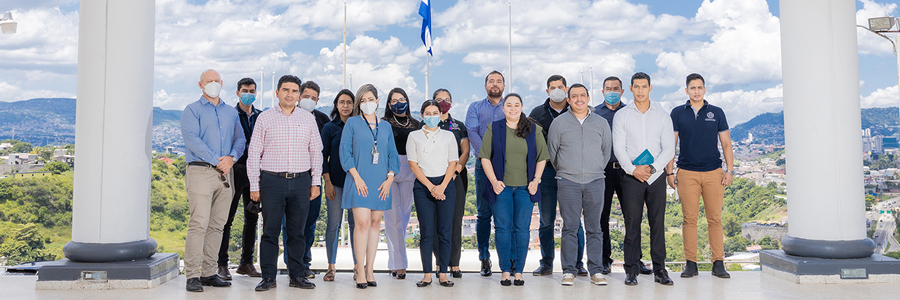
As a result of this collaboration between DCAF and DIDADPOL, the Communication Strategy was approved and implemented and continues to be the guiding document for all communications within DIDADPOL. Further, the Head of Comms for DIDADPOL recently carried out training to another part of the Security Ministry, incorporating learning from the work previously carried out with DCAF.
Following the gender training that included 100% of DIDADPOL staff, a new unit was created, that of the Human Rights and Gender Unit. A part of the DCAF training went further and carried out intensive training for four DIDADPOL staff, intended to be gender ‘champions’ for the organisation. This Unit and these four champions will be carrying out the DCAF Gender Self-Assessment on DIDAPOL in 2023, the first time that this has been implemented on an external control agency.
DIDADPOL now has a full staff contingent of 100 people, across two bases in the two main cities of Honduras and has had budgetary increases which has stabilised the organisation.
The authorities of DIDADPOL have expressed willingness to continue receiving this specialised advice and support from DCAF on specific issues, such as co-designing anti-discrimination and gender policies. Likewise, support has been provided to the DIDADPOL leadership in designing and implementing specialised training plans for different areas of the organisation, focusing on topics like Use of Force, accompanied by a monitoring and evaluation strategy.
Produced with the support of the Swiss Development Corporation, this first podcast hosts a discussion on the role of men in gender equity, specifically within police forces. Gender is too often sidelined in police forces as an issue for women, and men are not sufficiently represented in championing gender equity and participation.
In this podcast, male police leaders from Honduras and Colombia talk about their views on why gender equity is crucial to improving policing, and how International Men’s Day on the 19th of November is an opportunity for men to voice their support on this key issue.
The two below podcasts are an opportunity for Honduran National Police Officers with decades of experience to talk about their individual and institutional understanding of what it means to deliver Community Policing in Honduras. They talk through specific examples as well as concepts, offering insights from the strategic to the operational, based on lived experience in a fragile and high-violence context.
DCAF has been working in collaboration with the Honduran National Police, thanks to funding from the Swiss Development Corporation, on improving confidence between the community and policing.
Via innovative methodologies of co-design applied to strategic planning, gender equity, use of force, education, mentoring, internal and external controls and community policing, DCAF and the Police have together strengthened not just institutional systems but also how police think about their roles and responsibilities.
Watch the one-minute video for a quick overview:
Or watch the documentaries for more in-depth information:
Innovation in use of force Working together for better results Supporting the police to serve the community
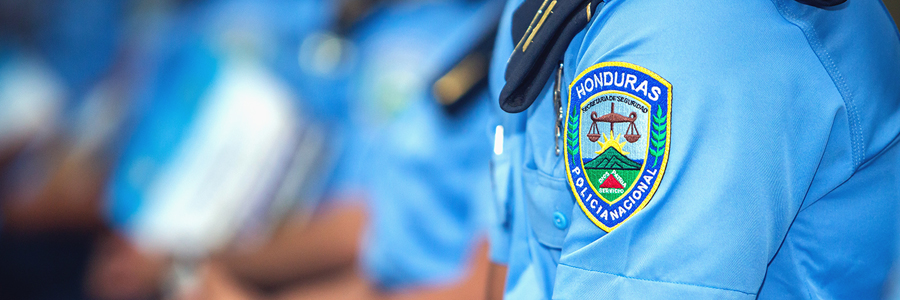
‘Contributions to the construction of a Latin American police model, the experience of Honduras’ documents the modernization process of the Honduras Police from 2018 to 2024, with the support of DCAF through the Police Advisory Programme funded by the Swiss Agency for Development and Cooperation.
Each chapter highlights findings in different areas of a new context-specific and Global South model of policing, providing valuable insights for other Latin American police forces considering similar reforms.
Topics covered include building police confidence, modernizing the police education system, gender mainstreaming in the police, developing a new use of force model, implementing external controls and accountability, and tackling future challenges, including the impact of climate change on public security.
The book is addressed to a varied audience composed of professionals and scholars involved in SSG/R, law enforcement, public policy, and social sciences within Latin America interested in understanding and applying localized police models that address the unique challenges and contexts of their countries. Policymakers, police reform advocates, and academic researchers will find valuable insights and practical guidance in the Honduran experience, which blends global knowledge with regional realities.
In addition, this book will be of value to anyone interested in the modernisation and effectiveness of police forces in Latin America, with the aim of increasing security and public trust in their communities.





